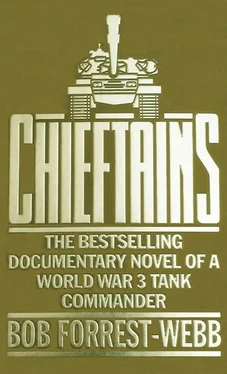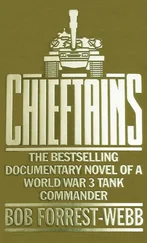‘Eight rounds, sir.’
‘Eight!’
‘Yes, sir. Plus what we’ve got in the driving compartment.’
‘DeeJay, help Spink with the ammunition. Pass it back to him.’
‘There isn’t any down here, just a lot of old rag in the lockers.’
‘Jesus Christ! Inkester, you’re supposed to have checked the ammunition.’ Inkester didn’t answer. ‘You should use your mouth less, boyo, and your brains more.’ There was no point in making a bigger issue of the matter, as commander it was basically Davis’s responsibility. In future, he would check everything himself. How the hell could they defend the village properly with only eight shells? He called up the other two tanks of Charlie Bravo Troop. Fourteen shells in Bravo Two, eighteen in Bravo Four. He reported to the squadron leader.
‘We’re all in the same boat, Charlie Bravo One. I requested more from Group two hours ago. God know’s where they’ve got to.’
Somewhere ahead of the squadron was the city of Braunschweig. Warrant Officer Morgan Davis guessed it must lie beneath the rose-tinted pall of smoke on the western horizon and having witnessed the destruction of the small towns and villages through which he had fought in the past twenty-four hours, he had no difficulty in imagining the devastation. Braunschweig was a sacrificial victim, a city whose death had been planned long before the outbreak of the war; a lynch-pin. Situated at a point where the Mittellandkanal and several tributaries met the winding river Schunter, it was a crucial pivot to swing the Soviet advance towards the north and into the river-latticed plain east of Hannover. Those parts of Braunschweig that had remained undamaged by the bombs, long-range shells and missiles of the Russians, would by now have been systematically demolished by the NATO engineers. For the second time in its recent history, its centre, the smart shops, offices, cinemas, theatres and restaurants would be only smoking rubble. Its suburbs of neat and orderly houses had become armour-snarling traps, blocked streets and mined parks; a lethal maze.
To the north of Braunschweig, and on the right of the squadron’s tanks, was the low range of hills, some forested and now sown with many thousands of bar and anti-personnel mines. Almost impenetrable to heavy tracked vehicles, it was the kind of ground that could only fall to slow, tedious and costly infantry assault; every hill-top and ridge defended and contested. An invader’s nightmare.
Davis had learnt you could defend every river, canal, pass, village and town, but no matter how well your men fought, sheer weight of numbers always beat you in the end and made the terrible loss of life mean nothing.
Too many times, it seemed like a million in the past forty hours, he had wanted more military strength around him. Too few tanks attempting to defend so much ground. Never enough of them to give security in depth. Soft defence was sound thinking, but it seemed to Davis to be based on an original weakness — lack of equipment. Make the most of what you have. Eight tanks the squadron had lost today and they hadn’t stopped the invaders, only slowed them down. And now, they were out of ammunition and pulling back again… back, always backwards. Always more frustration. So bloody unnecessary; wasteful.
How many kilometers abandoned today? Fifteen at least. And yesterday? And how many tomorrow? Fighting for what? Fighting for time. Time for reinforcements to arrive? For politicians to talk and negotiate? And negotiate what? The surrender of Germany to the Warsaw Pact countries? The promise to disarm and behave like good little boys?
The ammunition should have been up where it was needed, but it wasn’t. The gas had made things difficult for everyone. Good God, it wasn’t as though it was a possibility that had been ignored. Gas attacks had been expected; practised.
The wooded hills were already in shadows as the sun dropped behind their peaks. They looked peaceful enough, if you ignored the smoke over the horizon or didn’t look back towards the battlefront barely a kilometer away. Just a month previously the hills and woods had been filled with campers, hikers, and the evening bars of the towns and villages had been noisy and happy places. It was all another ‘world; history.
He saw the decontamination unit sited beneath the trees and followed the squadron leader’s Chieftain across the open ground towards it. The operators in their NBC clothing fired turbine powered blasts of liquid decontaminant over the tanks as they drove by. Fifty meters on they were stopped, while a final cleansing took place with hand-held sprays.
Less than a kilometer along a firebreak the squadron leader brought the squadron to a halt beside a line of fuel bowsers. Davis could see ammunition being unloaded from a trio of Heer Transportpanzers a little way ahead. Everything was taking too much time. The squadron had been lucky not to have been attacked while moving in the open, but they were even more vulnerable now.
He jerked open the front of his NBC suit and pulled the front of his sweater away from his chest. The air felt cool, refreshing. His sweater and vest were soaked with perspiration and he could smell his own sweat, stale and sour, mingling with the rubberized scent of the protective clothing. He would have liked to climb outside and stretch his legs in the open, try to get his bowels working; at the moment his intestines were cramped and made him feel as though he had gorged himself. But the crews had been ordered to remain inside their tanks as they queued for fuel and ammunition. The decontamination of the vehicles had been hasty, and it only needed a few drops of nerve gas liquid on a man’s skin to incapacitate him, perhaps kill. All the tanks carried injection kits, but whether or not these would be of any real use in counteracting the effects of the unknown Soviet gas was debatable.
Davis wondered what was being planned for the squadron. Knowing the captain would contact HQ, he tuned to the battle group net and felt guilty as he eavesdropped.
‘Valda?’ Davis recognized his squadron leader’s first name, but not the voice using it. ‘Where are you? The voice was languid, as though its owner had just climbed from his sleeping bag. Some bloody officers, thought Davis. They spoke so far back it was a miracle they didn’t swallow their tongues.
‘Postmark.’ It was the squadron leader.
‘Good fellow. Casualties?
A stupid bloody question, Davis cursed the man mentally. ‘Eight… I’ve reported each as it happened,’ said the squadron leader, and Davis was pleased to note an edge to the captain’s voice that matched his own feelings.
‘Just started my stag, haven’t caught up. Any problems?’
Christ! Any problems? What the hell was facing a Soviet army if it wasn’t a problem. Davis could feel his irritation swelling towards anger, but resisted an overwhelming urge to interrupt the conversation and give the officer a piece of his mind.
‘Of course we’ve got problems… God Almighty!’ Good for you, sir, thought Davis as Captain Willis allowed his irritation to show. ‘I called for ammunition two hours ago… where the hell was it? We’ve had to fall back to a depot. Falcon’s squadron moved in from the flank.’
‘I’m sorry.’ The officer’s voice was more subdued.
‘How much gas is there about?’ Willis asked curtly.
‘It’s being used along the entire front as far as we can tell. Wherever the Russians are being held they’re using chemicals. There have been chemical attacks on most of the airfields they can reach, and any supply concentrations.’
‘What about the civilians?’
‘What about them? Gas? We don’t know.’
‘Bastards!’
‘I’m a bit out of date.’ Like a hundred years, you berk, thought Davis. ‘I’d say, nasty. Not going too well in the north… that’s all I know.’
Читать дальше












